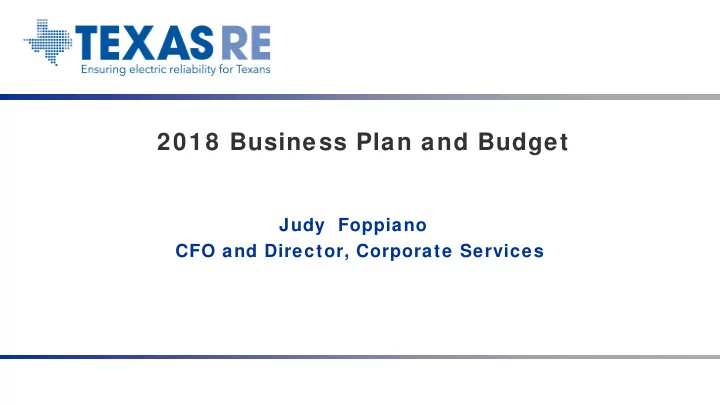

2018 Business Plan and Budget Judy Foppiano CFO and Director, Corporate Services Audit, Governance, and Finance Committee
2018 Statutory Budget Overview ● Total budget increase is 4.0% or $490K. ● Assessment Increase is 17.5% Using $725k of operating reserve to reduce assessments. ● Staffing remains constant with 60 FTEs. 2
2017 – 2018 Budget Comparison Statement of Activities, Fixed Assets Expenditures and Change in Working Capital 2017 and 2018 Budget Comparison 2017 2018 Variance Budget Budget Over(Under) % Variance Funding NERC Assessments $ 9,595,256 $ 11,271,986 $ 1,676,730 17.5% Penalty Sanctions 50,000 275,000 225,000 450.0% Interest 2,000 2,000 - 0.0% Total Funding $ 9,647,256 $ 11,548,986 $ 1,901,730 19.7% Expenses Personnel Expenses $ 9,374,519 $ 9,958,815 $ 584,296 6.2% Meeting & Travel Expenses 438,875 423,650 (15,225) -3.5% Operating Expenses 2,581,141 2,412,988 (168,153) -6.5% Total Expenses $ 12,394,535 $ 12,795,453 $ 400,918 3.2% Increase(Decrease) in Fixed Assets (227,279) (138,500) 88,779 TOTAL BUDGET $ 12,167,256 $ 12,656,953 $ 489,697 4.0% CHANGE IN WORKING CAPITAL $ (2,520,000) $ (1,107,967) $ 1,412,033 3
Texas RE 2018 Assessments ● Total Assessments are increasing 17.5% in 2018. ● Factors impacting assessment change: $275k penalty revenue to reduce 2018 assessments. No budget under-runs from prior years to apply. Increase in 2018 expense budget 4.0%. Using $725k from Operating Reserve to reduce assessments. 4
2018 Key Factors/Budget Assumptions Personnel Costs and Assumptions ● The number of FTEs is remaining constant for 2018 with 60 FTEs. ● The average available salary adjustment is 3%. ● Vacancy assumption is 2%. ● Promotions, market analysis and compensation studies were done in 2016 resulting in salary adjustments not considered in the 2017 budget. ● Health Benefits are projected to increase 15%. ● Retirement costs are driven by payroll and based on actual participation. Meeting and Travel Expense ● Decreasing 3.5% to reflect actual costs. ● The cost to host an off-site workshop has been eliminated. 5
2018 Key Factors/Budget Assumptions Operating Expenses ● Contract and Consultants and Office costs are decreasing to reflect historical costs. ● Rent and Utilities are increasing to accommodate utility charges allocated by the property manager based on prior year usage, price, and square footage. ● Professional services are increasing to reflect legal fees and insurance cost based on experience. ● Depreciation is decreasing due to assets fully depreciating. ● Total Operating Expenses are decreasing 6.5%. 6
2018 Key Factors/Budget Assumptions ● Texas RE will perform approximately 35-40 engagements, including all aspects of 693 and CIP risks identified through risk-based CMEP processes. Some engagements will be more complex as they may include Coordinated Oversight entities. ● The Texas RE Strategic Plan is structured around the ERO Strategic Plan. ● Texas RE Corporate goals are mapped directly to the ERO goals. ● There is no duplication of costs for NERC initiatives. ● Statutory funds are not used for State (Non-Statutory) activities. 7
2018 Budget by Functional Area 8
2017 - 2018 FTE Comparison Direct FTEs Shared Total FTEs Change Budget 2018 FTEs 2018 2018 from 2017 Total FTEs by Program Area 2017 Budget Budget Budget Budget STATUTORY Operational Programs Reliability Standards 1.50 1.50 - 1.50 - Compliance and Organization Registration and Certificat 36.25 36.25 - 36.25 - Training and Education 2.25 2.25 - 2.25 - Reliability Assessment and Performance Analysis 6.25 6.25 - 6.25 - - Total FTEs Operational Programs 46.25 46.25 - 46.25 - Administrative Programs General & Administrative 3.00 3.00 - 3.00 - Legal and Regulatory 2.75 2.75 - 2.75 - Information Technology 5.00 5.00 - 5.00 - Human Resources - - - - - Finance and Accounting 3.00 3.00 - 3.00 - Total FTEs Administrative Programs 13.75 13.75 - 13.75 - Total FTEs 60.00 60.00 - 60.00 - A shared FTE is defined as an employee who performs both Statutory and Non-Statutory functions. 9
Operating Reserve and Working Capital ● The purpose of the Board-approved Working Capital and Operating Reserve policy for Texas RE is to ensure the stability of the ongoing operations of the organization. ● The Working Capital and Operating Reserve is intended to provide funds for situations such as a sudden unanticipated increase in expenses, one-time unbudgeted expenses, uninsured losses, or contested Enforcement matters. ● $725k of this reserve is being used to reduce assessments in 2018. The amount will be replenished in 2019 and 2020. 10
2019 – 2020 Budget Projections ● 4% escalation rate applied to expense categories. ● No changes in personnel. ● 2019 - Total budget increase of $501k . Assessments increase 17.5%. ● 2020 - Total budget increase of $531k . Assessments increase 3.8%. 2019 and 2020 will assessments will be increased to reimburse operating reserve for 2018 offset in assessments. Any penalty revenue will follow the FERC requirement to offset assessments. Otherwise, assessments will equal budget. 11
Questions? 12
Recommend
More recommend